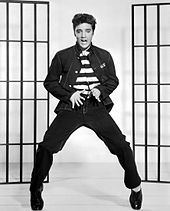Pelvic thrust
The pelvic thrust is the thrusting motion of the pelvic region, which is used for a variety of activities, such as dance, exercise, or sexual activity.
Sexual activity
[edit]
The pelvic thrust is used during copulation by many species of mammals,[1][2][3] including humans,[4] or for other sexual activities (such as non-penetrative sex). In 2007, German scientists noted that female monkeys could increase the vigor and number of pelvic thrusts made by the male by shouting during intercourse.[5] In whitetail deer, copulation consists of a single pelvic thrust.[6]
Dance
[edit]
One of the first to perform this move on stage was Elvis Presley. It was quite controversial due to its obvious sexual connotations. Due to this controversy, he was sometimes shown (as seen on his third appearance on The Ed Sullivan Show) from the waist up on TV.[7] Later, the pelvic thrust also became one of the signature moves of Michael Jackson.[8] It is also mentioned in "Time Warp", a song from The Rocky Horror Show, as a part of the choreography associated with the warp itself. Twerking, a reverse and sometimes passive form of pelvic thrust dance move, is also a very popular form of hip-hop dance move. The sideways pelvic thrust is a famous female dance move in India and Bangladesh and known as thumka. It appears in the lyrics of various Bollywood songs.[citation needed]
Exercise
[edit]Hip thrusts can be used as an exercise to train the gluteus maximus muscle. The athlete will get into a reclined position and thrust their hips upward to lift weights balanced on their lap.[9][10]
Infants
[edit]Pelvic thrusting is observed in infant monkeys, apes, and humans. These observations led ethologist John Bowlby (1969) to suggest that infantile sexual behavior may be the rule in mammals, not the exception. Thrusting has been observed in humans at eight to 10 months of age and may be an expression of affection. Typically, the infant clings to the parent, then nuzzles, thrusts, and rotates the pelvis for several seconds.[11]
See also
[edit]References
[edit]- ^ R. D. Estes (1991). The Behavior Guide to African Mammals: Including Hoofed Mammals, Carnivores, Primates. University of California Press. ISBN 978-0-520-08085-0. Retrieved 28 July 2013.
copulation thrusting.
- ^ Bruce Bagemihl (15 January 1999). Biological Exuberance: Animal Homosexuality and Natural Diversity. Macmillan. ISBN 978-0-312-19239-6.
- ^ A. F. Dixson (26 January 2012). Primate Sexuality: Comparative Studies of the Prosimians, Monkeys, Apes, and Humans. Oxford University Press. ISBN 978-0-19-954464-6.
- ^ Nilamadhab Kar; Gopal Chandra Kar (2005). Comprehensive Textbook of Sexual Medicine. Jaypee Brothers Publishers. pp. 107–112. ISBN 81-8061-405-0. Retrieved February 10, 2014.[permanent dead link]
- ^ "Study Reveals Why Monkeys Shout During Sex". livescience.com. Charles Q. Choi. 18 December 2007.
- ^ Leonard Lee Rue (3 September 2013). Whitetail Savvy: New Research and Observations about America's Most Popular Big Game Animal. Skyhorse Publishing. ISBN 978-1-62636-531-5.
- ^ "Welcome to EIN". Elvisinfonet.com. Retrieved 2013-08-01.
- ^ "#HappyBirthdayMJ – Top 5 iconic steps Michael Jackson floored us with". Business Insider. Retrieved 3 April 2017.
- ^ Neto, Walter Krause; Vieira, Thais Lima; Gama, Eliane Florencio (June 2019). "Barbell Hip Thrust, Muscular Activation and Performance: A Systematic Review". Journal of Sports Science & Medicine. 18 (2): 198–206. ISSN 1303-2968. PMC 6544005. PMID 31191088.
- ^ Soong, Damian (2020-09-24). "This Is the Best Exercise for Your Glutes, According To Science". Form. Retrieved 2023-03-21.
- ^ Rathus, Spencer: Human sexuality in a world of diversity (2007) p. 314
Bibliography
[edit]- Tim Glover (30 June 2012). Mating Males: An Evolutionary Perspective on Mammalian Reproduction. Cambridge University Press. ISBN 978-1-107-00001-8. Retrieved 11 May 2013.
- Jean-Baptiste Leca; Michael A. Huffman; Paul L. Vasey (19 January 2012). The Monkeys of Stormy Mountain: 60 Years of Primatological Research on the Japanese Macaques of Arashiyama. Cambridge University Press. ISBN 978-0-521-76185-7. Retrieved 19 May 2013.
- H. Frank (30 April 1987). Man and Wolf: Advances, Issues, and Problems in Captive Wolf Research. Springer. ISBN 978-90-6193-614-5. Retrieved 19 May 2013.
- Alan F. Dixson (26 January 2012). Primate Sexuality: Comparative Studies of the Prosimians, Monkeys, Apes, and Humans. Oxford University Press. ISBN 978-0-19-150342-9. Retrieved 19 May 2013.
- Edward C. Feldman; Richard Richard William Nelson (2004). Canine and feline endocrinology and reproduction. Elsevier Health Sciences. ISBN 978-0-7216-9315-6. Retrieved 19 May 2013.
- Katherine A. Houpt (25 January 2011). Domestic Animal Behavior for Veterinarians and Animal Scientists. John Wiley & Sons. ISBN 978-0-470-95843-8. Retrieved 19 May 2013.
